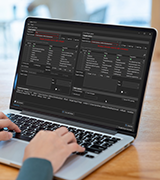
Kroll Artifact Parser And Extractor (KAPE)
Find, collect and process forensically useful artifacts in minutes.
Purpose–Built to Expedite and Optimize Forensic Investigations
Screening and Monitoring
How KAPE Works
Over 60 Predefined Targets and 90 Modules
KAPE has two primary phases – target collection and module execution:
- Targets are essentially collections of file and directory specifications.
- Modules are used to run programs, which can target anything, including files collected via targets as well as any other kinds of programs you may want to run on a system from a live response perspective.
KAPE gives you access to targets and modules for the most common operations required in forensic exams, helping investigators gather a wider range of artifacts in a fraction of the time, enriching evidentiary libraries.

Grouping Artifacts Expedites Triage
KAPE focuses on collecting and processing relevant data quickly, grouping artifacts in categorized directories such as EvidenceOfExecution, BrowserHistory and AccountUsage. Grouping things by category means an examiner no longer needs to know how to process prefetch, shimcache, amcache, userassist, etc., as they relate to evidence of execution artifacts.

Standardize Forensic Processes
When handling an incident, forensic examiners are tasked with knowing which artifacts to collect, where they may reside, and how to collect the data without damaging the evidence or chain of custody. With KAPE, forensic examiners have a solution to find, collect and process forensic artifacts in a way that standardizes forensic engagements by leveraging a wider range of extracted artifacts. KAPE can also help facilitate the onboarding and training of new investigators by standardizing and scaling artifact pulls.

Continually Evolving Dynamic Solution
Kroll works on some of the most complex and highest profile cyber incidents in the world and performs digital forensics and evidence collection for thousands of companies. This unique frontline insight from our experts is enhanced by input from the global DFIR community to actively contribute to the development of KAPE. To learn more:
- Read the official KAPE Changelog
- Browse the KAPE Documentation
Clarifying KAPE Usage Permission
- KAPE is free for any local, state, federal or international government agency.
- KAPE is free for educational and research use.
- KAPE is free for internal company use.
- KAPE requires a enterprise license when used on a third-party network and/or as part of a paid engagement.
Read more about KAPE enterprise licenses here.

Increased Cyber Resilience with a Cyber Risk Retainer
Stay Ahead with Kroll
KAPE Resources
This page houses official documentation relating the Kroll Artifact Parser and Extractor (KAPE). It will also contain the latest KAPE news, as well as webcasts, case studies, tutorials and other training materials. For any KAPE related questions or assistance with customizations, please contact [email protected].









